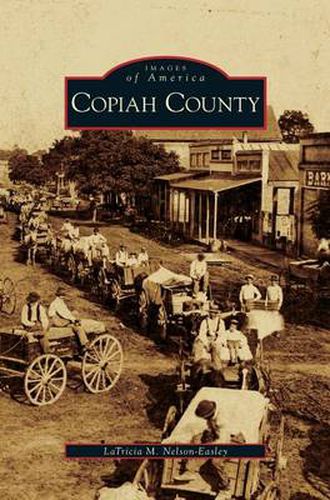Readings Newsletter
Become a Readings Member to make your shopping experience even easier.
Sign in or sign up for free!
You’re not far away from qualifying for FREE standard shipping within Australia
You’ve qualified for FREE standard shipping within Australia
The cart is loading…






This title is printed to order. This book may have been self-published. If so, we cannot guarantee the quality of the content. In the main most books will have gone through the editing process however some may not. We therefore suggest that you be aware of this before ordering this book. If in doubt check either the author or publisher’s details as we are unable to accept any returns unless they are faulty. Please contact us if you have any questions.
Named after a Native American word meaning calling panther, Copiah County was organized after an agreement was reached with the Choctaw Indians in the Treaty of Doak’s Stand in 1820. Located 20 miles from the state capital of Jackson, the county was organized in January 1823 and quickly became an agricultural and manufacturing namesake. Once known as the Tomato Capital of the World, the county was the location of the largest Chautauqua assemblies in the South and the site of the founding of the Mississippi Parent Teacher Association. The extinct town of Brown’s Wells once produced spring water that healed the rich and famous. Notable citizens from Copiah County include bluesman Robert Johnson; Maj. R. W. Millsaps, for whom Millsaps College was named; Burnita Shelton Matthews, the first female federal district court judge; Pat Harrison, a former representative and senator; Albert Gallatin Brown, a former governor; and Fannye Cook, an author and the first director of the Mississippi Museum of Natural Science.
$9.00 standard shipping within Australia
FREE standard shipping within Australia for orders over $100.00
Express & International shipping calculated at checkout
This title is printed to order. This book may have been self-published. If so, we cannot guarantee the quality of the content. In the main most books will have gone through the editing process however some may not. We therefore suggest that you be aware of this before ordering this book. If in doubt check either the author or publisher’s details as we are unable to accept any returns unless they are faulty. Please contact us if you have any questions.
Named after a Native American word meaning calling panther, Copiah County was organized after an agreement was reached with the Choctaw Indians in the Treaty of Doak’s Stand in 1820. Located 20 miles from the state capital of Jackson, the county was organized in January 1823 and quickly became an agricultural and manufacturing namesake. Once known as the Tomato Capital of the World, the county was the location of the largest Chautauqua assemblies in the South and the site of the founding of the Mississippi Parent Teacher Association. The extinct town of Brown’s Wells once produced spring water that healed the rich and famous. Notable citizens from Copiah County include bluesman Robert Johnson; Maj. R. W. Millsaps, for whom Millsaps College was named; Burnita Shelton Matthews, the first female federal district court judge; Pat Harrison, a former representative and senator; Albert Gallatin Brown, a former governor; and Fannye Cook, an author and the first director of the Mississippi Museum of Natural Science.